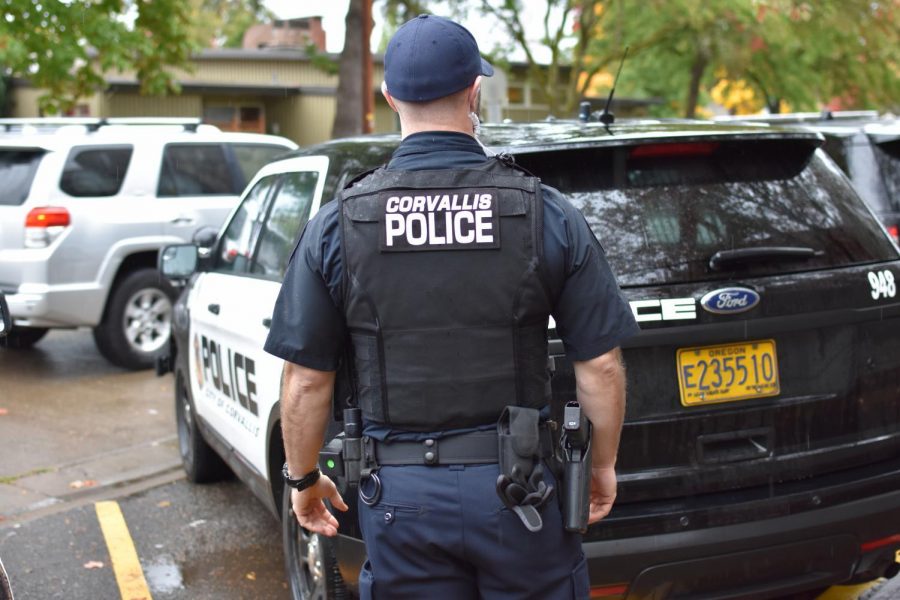Halloweekend creates influx of people, higher likelihood of legal violations
October 22, 2017
Police advise students how to act when approached by officers in regards to noise complaints, Minor In Possession tickets.
Scaley mermaids, black cats and rowdy television characters crowd the streets. The sky is dark and heels are clicking loudly against the uneven sidewalk. A cheer arises from the crowd of impaired college students; at the same time, a siren comes from the distance. The next move is imperative.
Around the time of Halloween, there tends to be a flood of people, noises and underage drinking, according to Sergeant Joel Goodwin, who is responsible for the Community Livability Unit at the Corvallis Police Department.
“We consistently see a significant influx of people to Corvallis just for the parties, and many people feel the need to drink an excessive amount of alcohol,” Goodwin said in an email. “This results in a lot of livability issues for the entire community—noise, vandalism, etc.—as well as risks to those doing the partying.”
Drinking alone can put students at risk for overdose, receiving a Minor In Possession violation or poor decisions in general, which can lead to even further repercussions from the police, according to Goodwin.
“A person’s conduct is typically what leads to officer contact, which can result in an MIP citation,” Goodwin said in an email. “For example, if someone is engaging in unlawful activity—urinating in public, being unreasonably loud, carrying an open container of alcohol—an officer is likely to stop and talk with that person.”
According to Suzy Tannenbaum, director of Public Safety, a student who receives an MIP will be sent to juvenile court or receive a criminal citation. Individuals should always abide by the instructions given by the officer(s), Tannenbaum added.
“The student may be fined and/or required to perform community service. The student may also be sent to alcohol assessment or treatment,” Tannenbaum said in an email. “It’s important that the student follow all of the sanctions that the judge sets.”
In Corvallis, the two most common noise ordinances are loud noise and unlawful amplified sound, according to Goodwin.
“Loud noise is just that—someone causes unreasonable noise. In a party situation, this would typically be voices yelling from a crowd,” Goodwin said in an email. “This is a violation—not a crime—so someone cited for this offense can appear in court or address the citation by mail, similar to a traffic ticket.”
Unlawful amplified sound ordinances differ in comparison to loud noise, according to Goodwin. Amplified stereo sounds which can be heard from over 50 feet away during any part of the day is a crime in Corvallis. Though CPD generally issues a citation, as opposed to a physical body arrest, there is still a requirement to appear in court, Goodwin added.
“Unfortunately, sometimes people make poor decisions when the police come and knock on the door, which can make the situation worse,” Goodwin said in an email. “If someone chooses to have a get-together, the best advice is to keep it small, keep it quiet and don’t allow people in that you don’t know. If the police do show up, realize how you respond to the officer(s) will likely impact how they exercise their enforcement discretion.”
An MIP is a violation which does not count as an arrest and does not go on a permanent record, according to Goodwin. Because of this, how you react to receiving an MIP or noise complaint is principal. Running, lying or fighting with CPD results in making the situation even worse than it needs to be, Goodwin added.
“I am often asked, ‘What is the best way to avoid an MIP ticket?’ The answer is fairly simple—don’t drink until you are 21,” Goodwin said in an email. “If someone chooses to drink before they turn 21, they may end up getting a ticket, going to court, paying some fines and/or going to court-mandated classes.”
According to Cassady Gilroy, a former residence assistant, if students were found underage drinking in the residence halls, the police were generally not called. However, any student resident would have the alcohol confiscated and would mandatorily meet with the hall’s Resident Director.
“If they are being boisterous or unwilling to quiet down or give up the alcohol, then we do have grounds to call the police and they would take over,” Gilroy said in an email.
According to Gilroy, in most cases it will be that the incidents in residence halls are documented and then given over to the Resident Director to handle.
“Regarding Halloween weekend specifically, CPD and OSP will both be increasing staffing levels to more than double their usual amounts, which will include bike and/or foot patrols,” Goodwin said in an email. “It is typically our busiest weekend of the year.”
























































































































